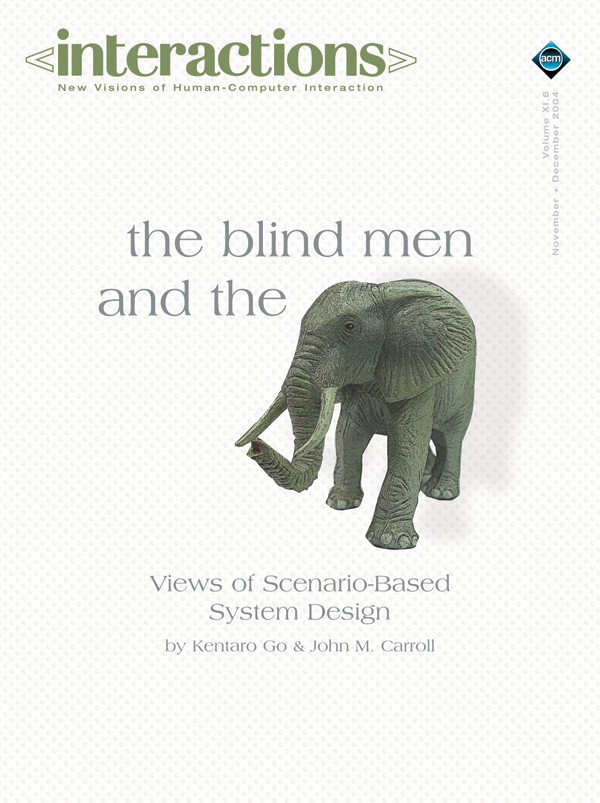Table of Contents
VOLUME XI.6 November + December 2004
- Editorial
-
Research alert
-
In Pursuit of Desktop Evolution
Pamela Ravasio, Sissel Schär, Helmut Krueger
The Desktop Metaphor: After 40 years of usage, what problems persist in its everyday usage? Today, working with the desktop metaphor requires memorizing conventions and procedures rather than interacting intuitively and in a straightforward manner. However, detailed information as to users' common practices, their specific problems, how they cope…
-
Usability and collaborative aspects of augmented reality
Morten Fjeld
In the past few years, augmented reality (AR) has received increasing attention from research and industry. By nature, AR is a highly interdisciplinary field engaging signal processing, computer vision, computer graphics, user interfaces, human factors, wearable computing, mobile computing, information visualization, and the design of displays and sensors. AR…
-
-
What's happening
-
What’s happening
Marisa Campbell
Workshops Tamodia 2004 3rd International Workshop on TAsk MOdels and DIAgrams for User Interface Design Prague, Czech Republic November 15-16, 2004 To design user interfaces for interactive computer-based systems, many forms of expression have been used and some new forms are currently being investigated by combining writing, drawing, sketching,…
-
-
Business
-
When good things happen to bad products
Timo Jokela
In some of these cases usability problems impacted negatively on customer satisfaction and business success, while in other cases they did not. How do we explain this, especially the market success of products with usability problems? We in the user-centered design (UCD) profession tend to promote usability by arguing…
-
-
Design
-
Animated use sketches as design representations
Jonas Löwgren
To summarize, a representation technique is needed that is expressive in terms of detailed design, sketchy in its expression, and versatile in its ability to create fictions. I have experimented with a representation technique that seems to fulfill these three criteria quite well. Animated use sketches are animated movies…
-
-
The whiteboard
-
The race of the web sites
Kathy Gill
Method The two candidates' sites are www.johnkerry.com and www.georgebush.com. I visited both sites from two perspectives: as an undecided voter and a committed voter. As an unaligned voter, I looked for the following: Candidate position on health care/prescription drugs Candidate position on economy/jobs Candidate military service…
-
-
HCI and the Web
-
Attentional gambling
William Hudson
I first came across the concept of "attentional" gambling while I was researching an article on change blindness, a phenomenon where we fail to notice even fairly obvious changes between images if they are separated briefly by a blank field. (That is, in precisely the situation where we would…
-
-
Reflections
-
Things that stay us from the swift completion of our appointed tasks (revisited)
Steven Pemberton
It has been long known that since 1665, the number of scientific journals has been growing exponentially, doubling every 15 years. Clearly there has to be a limit to that growth, unless one day we will all be publishing our own scientific journal (and 15 years later, two scientific…
-
-
Conferences
-
CSCW 2004
Marisa Campbell
CSCW 2004, the ACM Conference on Computer-Supported Cooperative Work, is a leading forum for presenting and discussing research and development achievements in the design, introduction and use of technologies that affect groups, organizations, communities, and societies. As well as covering traditional topics around work and working relationships, the conference…
-
-
Fast forward
-
It’s about time
Aaron Marcus
Einstein is famous for, among other things, making time a dimension like spatial dimensions and for introducing the relativity of time [29]. Recent studies of string theory and "theories of everything" [9] even make time merely one of ten dimensions. Piaget wrote The Child's Conception of Time, in which…
-
-
Books
-
Books
Francesco Cara
Natural-Born Cyborgs: Minds, Technologies, and the Future of Human Intelligence Andy Clark Oxford University Press ISBN 0195148665 $26.00 The latest book by philosopher and cognitive scientist Andy Clark is a challenging and eclectic discussion of how the relationship between biology, technology and culture construes our mind and…
-



